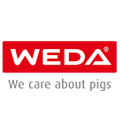 The basic concept aims to enable pig farmers to ferment raw, full-fat soy beans among others as a high-value feeding stuff in their own operations. The method is based on a sophisticated combination of temperature and specific bacteria and enzymes. The technological basis for this is a fermentation process conceived by WEDA, which has proven itself over years in the daily practice of pig farming. Beyond that, WEDA contributes a great degree of experience in the integrated process control, monitoring and mixing technology essential for this process.
The basic concept aims to enable pig farmers to ferment raw, full-fat soy beans among others as a high-value feeding stuff in their own operations. The method is based on a sophisticated combination of temperature and specific bacteria and enzymes. The technological basis for this is a fermentation process conceived by WEDA, which has proven itself over years in the daily practice of pig farming. Beyond that, WEDA contributes a great degree of experience in the integrated process control, monitoring and mixing technology essential for this process.
The method works according to the so-called synchronised batch fermentation, where two fermenters process the raw material in turns. Hygiene plays a large part in this process: one fermenter always undergoes cleaning while the fermentation process goes on in the other. At its core, the new fermentation method also aims at an efficient process for the degradation of the anti-nutrition factors contained in raw soy. To date, these harmful essences had to be eliminated using a complicated roasting or extrusion method. The risk, however, is that not all anti-nutrition factors are completely deactivated at all times with this method.

One essential benefit of fermentation: in contrast to all other methods, it generates a high portion of valuable lactic acid, which promotes gastrointestinal health in animals and significantly reduces salmonella as well as E. coli. Beyond that, other materials can also be easily processed depending on requirements and costs. Therefore, fermentation might prove profitable and useful to operations in several regards: in animal husbandry, and particularly in larger operations, there is an increasing demand for individual feed, for example for young animals. For farmers, it would be accordingly attractive to ferment e.g. raw soy beans, raw peas and raw beans themselves or to incorporate especially fermented feed into their feed rations. The results of the operations using this method speak for themselves: increased productivity as well as significant reductions in medicine and additive administration.
Add to that an environmental factor: normal feed must be mixed with phosphor, increasing the presence of this substance in the liquid manure and consequently leading to increased values when spread on fields. Phosphor in fermented feed in contrast is utilised by the animals with increased efficiency, leading to reduced quantities ending up in the manure and thus in the soil at the end of the chain. Besides this environmental aspect, there is also an essential economic benefit to be observed in all balances: Dr. Ronald Scholten attests the new fermentation method a final yearly cost advantage of roughly 50,000 euros per 1,000 sows including piglets.
13 del 5 de 2019 - Weda




